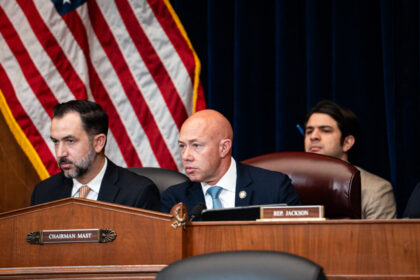It started with a song – one that millions in China put on replay, even though its words came from a politician who wants Taiwan’s independence.
Beijing’s gray zone efforts are spreading across Taiwanese society through various media platforms – many of them Chinese-owned, like TikTok or Rednote – portraying China as a friendly neighbor and encouraging young Taiwanese to see themselves as part of the same people. Members of Taiwan’s ruling Democratic Progressive Party (DPP) have tried to push for restrictions on TikTok, citing concerns over data privacy and the app’s potential to spread Chinese propaganda among the youth.
Beijing, in turn, responded with what could be called a “friendly offensive.”
Chinese state media recently popularized an old video of Taiwanese legislator Wang Shih-cheng, recorded when he was still a Taipei city councilor. In the clip, Wang criticizes the city’s mayor – but Chinese netizens and state-affiliated accounts repurposed his words, turning them into an AI-generated song that quickly went viral, garnering millions of views across the Chinese internet.
The song’s lyrics:
It was supposed to be smooth and easy,
But now you’re a mess – running around, tripping over yourself.
Lying straight-faced – what are you getting emotional about?
Crying? Seriously? Don’t be pathetic.
The song resonated deeply in China, depicting a sense of youthful hope fading into midlife despair – a reflection of how many Chinese citizens feel today.
Soon after, the Chinese Taiwan Affairs Office referenced the lyrics in its regular press briefing, using them as a metaphor to criticize the current state of cross-strait relations. The TAO implied that ties have gone from “smooth and easy” to “a mess, tripping over themselves.”
But there was another layer of irony: Wang is a well-known pro-independence politician. When Taiwanese media asked for his thoughts about his sudden fame in China, he simply replied, “The internet is full of life and creativity.”
This is one of the rare cases where the Chinese Communist Party’s official channels have amplified the words of a pro-independence politician. Yet this approach appears to be working: gradually, more DPP supporters are expressing opposition to banning TikTok. Across Taiwanese social media, pan-green voters increasingly argue that “Taiwan can also use TikTok to influence China” – framing the platform as a two-way tool rather than a propaganda threat.
Meanwhile, an increasing number of Taiwanese YouTubers, TikTokers, and other influencers are traveling to China to livestream and produce lifestyle videos portraying China as friendly, modern, and open. These seemingly harmless clips have a cumulative effect: they soften public perceptions of China and create an illusion of safety – a sense that “we’re all the same people” and that Beijing poses no real threat.
At the same time, skepticism toward Taiwan’s key partner, the United States, is quietly growing. A recent Taiwan Public Opinion Foundation survey found that 44.8 percent of respondents do not believe U.S. President Donald Trump is willing to stop China from invading Taiwan, while only 6.8 percent believe he would act to protect Taiwan. This is striking, given how many prominent figures in the current United States’ political landscape – including Secretary of State Marco Rubio, Vice President J.D. Vance, and Secretary of Defense Pete Hegseth – have been vocal about strengthening Taiwan’s defense.
The United States urgently needs a more comprehensive strategy to counter Beijing’s subversion efforts – not only at home, but also abroad. During the Cold War, Washington excelled at communicating its values and strategic messages to allies, providing alternative sources of information to those behind the Iron Curtain.
Taiwan today needs not only U.S. military support but also help in the ideological battle against Chinese influence operations. Beijing’s messaging is slow but steady, and it is reshaping public attitudes in Taiwan in ways that could erode resistance to unification.
If Washington wishes to prevent this, it must pair its defense commitments with a renewed communication strategy – one that reinforces trust, transparency, and shared democratic identity among its allies. Otherwise, China’s soft power offensive may succeed where military coercion could not.






